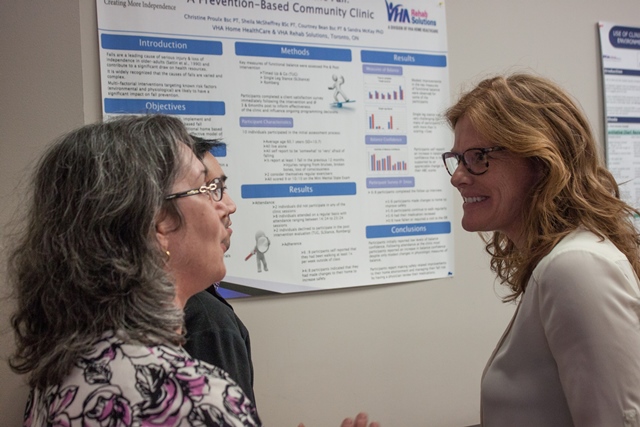
For many, the notion of a medical #research project usually conjures up images of an isolated, white, sterile room somewhere deep inside a world-class hospital or university lab. And while this may be true in some instances, VHA Home HealthCare (VHA)—in partnership with several renowned hospitals, academic institutes and governmental research initiatives—is working hard to bring health care research home, quite literally.
“So much of patient care research is based on hospital-focused studies,” notes Dr. Sandra McKay, VHA’s manager of research and evaluation and an adjunct lecturer in the University of Toronto’s (UofT) Department of Physical Therapy. “While the goals may be the same, the environments couldn’t be more different. There’s a real opportunity here—especially in light of the growing attention being paid to community care—to not only build awareness and capacity in the #home care industry but also drive high-impact solutions within the health care system overall.” She stresses the importance of creating a ladder of engagement—one that moves VHA from a supporter of research projects to a driver in the design of research questions and the work to answer them.
“Creating a sharper focus on key areas of research has really helped us shape the direction of the research we choose to pursue and engage in,” McKay adds, noting VHA’s three research pillars hone in on:
- Cognitive impairment
- Children with complex medical needs
- Clinical and health services excellence
“The fact that the pillars are anchored in the themes of client (patient) and family engagement, technology, self-management and independence is no accident,” notes VHA’s Vice President, Best Practices, Research and Education and Chief Nursing Executive, Bea Mudge. “They not only tie in with trends in the health care system, but dovetail well with our core beliefs—that clients and their families know best what they need, that they are in the driver’s seat, and that advances in technology can be a huge asset for clients and home care staff alike.”
Working Together to Find Solutions
Making the shift from a “supporter” to “driver” of home care research doesn’t happen overnight. It has required a strategic shift in VHA’s approach to research projects. The organization knew that partnerships and collaboration would fast-track its development and build lasting relationships with key players in the worlds of academic and hospital-based research. “Connections to hospitals like Sick Kids, University Health Network (including Toronto Rehab), and Women’s College Hospital, as well as academic institutions such as U of T, Ryerson, Western and Waterloo universities are vital to creating meaningful, positive and systemic change. They’re thought leaders VHA can learn from. But the symbiotic nature of the relationship means VHA’s experience and depth of knowledge in home care also provides a unique perspective that helps to inform and steer the direction of the research,” says McKay. VHA, she adds, hopes to partner with global home care leaders in the near future.
Several dynamic research projects are currently underway and employ a range of topics and methodologies. Some are based on experiential insights of clients or family members. VHA’s collaboration with Sick Kids Hospital, for example, explores the sleep habits of family caregivers to children with medical complexities and a dependence on medical technology. In getting caregivers’ perceptions and willingness to try sleep-promoting techniques, the study hopes to ultimately uncover solutions to help these caregivers (usually the parents of the child client) to sleep, feel and function better overall.
Other studies seek to find meaning in existing data to determine whether there are any significant trends that may impact home care. Women’s College Hospital, U of T and VHA recently joined forces to review home care data of “found on floor” incidents, where clients had fallen and had been found on the floor by their home care worker. The results of this research could help uncover patterns in the home and deliver recommendations for falls prevention.
“Sometimes,” notes McKay, “technology and experience intersect in this research.” The study of sensor technology use as a possible way to reduce stress among family caregivers of older adults is a case in point. The partnership involves VHA, the University of Waterloo and AGE-WELL– a network of researchers, community partners and businesses whose aim is to accelerate solutions for older adults to remain at home. The research wants to determine if sensor technology—either wearable, installed on appliances or set up at home—could be used to help family caregivers stay informed while they’re at work or away from home and whether this information will reduce caregiver stress.
“These are really exciting times in home care research,” says McKay. “We’re connecting with thought leaders in such a purposeful and important way. While some of these projects will take years to carry out and analyze, we hope the results—both in shining a spotlight on home care and in revealing quality improvements—will significantly impact the entire health care system.”
To learn more about VHA’s research projects visit: https://www.vha.ca/vha-research

